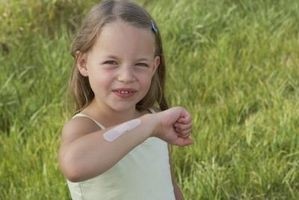Important First Aid & Safety Tips For Kids

The risk of accidental injury exists for everyone, especially children. Although protecting your kids from everything is impossible, being prepared for an emergency before it occurs helps to provide much-needed peace of mind. Educate yourself as well as your child on what to do in certain circumstances that require first aid, and always practice preventative procedures to lower the chances of the accident happening in the first place.
Fire/Burns
Safe Kids USA lists preparation and education as the two most important factors in avoiding a fire tragedy. Have smoke alarms both inside and outside of every sleeping area, and check the batteries monthly. Do not allow children under 14 to operate any kitchen appliances without direct supervision, and in no circumstance should they do any cooking unattended. Practice an escape route with your children so if a fire does occur, they know exactly where to go. Remind them to stay low and touch doors to gauge temperature before opening them. If your child is burned, run cool water over the area until pain lessens. Seek emergency medical care immediately if the burns are severe.
Water/Drowning
Never allow children to swim alone, even if they have extensive swimming experience. If they have long hair, assist them with pinning it up before they get in the water. In the event you are in a boat or near any source of open water, make sure all children are wearing a Coast Guard-approved life jacket. Equip children with some form of foot protection and remind them to watch out for jagged stones or broken glass when swimming in a lake or pond. Keep children away from docks or marinas with electric hookups or lighting to avoid the risk of electrocution.
Poison
Give strong consideration to installing carbon monoxide detectors in your home if you have not already done so. Although carbon monoxide may not affect adults in small doses, it can kill children or at least make them seriously ill. Never leave any prescription medications or pills within reach of your children, even if they are familiar with the drug and have taken it previously. Keep cleaning chemicals and any product that contains alcohol safely hidden from children. If your child ingests a poisonous substance, contact your local Poison Control Center right away. Watch for symptoms such as excessive drowsiness, vomiting or a confused mental state.
Cuts
Help your children avoid cuts by reminding them to wear shoes when playing outside. Take note of any tables or counters with sharp edges around the house, pointing these dangerous areas out to any child in the house. Never allow children to use any sharp utensils like knives or scissors without direct supervision. Minor cuts are easily treatable at home by rinsing the wound and covering with a band-aid, but more severe gashes or any cut that will not stop bleeding requires immediate medical attention. In the event your child has a cut that warrants a trip to the emergency room, keep the inflicted body part raised to slow bleeding; apply pressure with a sterile gauze or band-aid.
Fire/Burns
Safe Kids USA lists preparation and education as the two most important factors in avoiding a fire tragedy. Have smoke alarms both inside and outside of every sleeping area, and check the batteries monthly. Do not allow children under 14 to operate any kitchen appliances without direct supervision, and in no circumstance should they do any cooking unattended. Practice an escape route with your children so if a fire does occur, they know exactly where to go. Remind them to stay low and touch doors to gauge temperature before opening them. If your child is burned, run cool water over the area until pain lessens. Seek emergency medical care immediately if the burns are severe.
Water/Drowning
Never allow children to swim alone, even if they have extensive swimming experience. If they have long hair, assist them with pinning it up before they get in the water. In the event you are in a boat or near any source of open water, make sure all children are wearing a Coast Guard-approved life jacket. Equip children with some form of foot protection and remind them to watch out for jagged stones or broken glass when swimming in a lake or pond. Keep children away from docks or marinas with electric hookups or lighting to avoid the risk of electrocution.
Poison
Give strong consideration to installing carbon monoxide detectors in your home if you have not already done so. Although carbon monoxide may not affect adults in small doses, it can kill children or at least make them seriously ill. Never leave any prescription medications or pills within reach of your children, even if they are familiar with the drug and have taken it previously. Keep cleaning chemicals and any product that contains alcohol safely hidden from children. If your child ingests a poisonous substance, contact your local Poison Control Center right away. Watch for symptoms such as excessive drowsiness, vomiting or a confused mental state.
Cuts
Help your children avoid cuts by reminding them to wear shoes when playing outside. Take note of any tables or counters with sharp edges around the house, pointing these dangerous areas out to any child in the house. Never allow children to use any sharp utensils like knives or scissors without direct supervision. Minor cuts are easily treatable at home by rinsing the wound and covering with a band-aid, but more severe gashes or any cut that will not stop bleeding requires immediate medical attention. In the event your child has a cut that warrants a trip to the emergency room, keep the inflicted body part raised to slow bleeding; apply pressure with a sterile gauze or band-aid.
- 1ke2e8b1154c34a1a41edf4dd5be4e9cc8.jpg
- fu79e89829a8d5c52c86296ca3cfa72436.jpg
Videos
Child Safety Inside & Outside the Home - First Aid & CPR
References
http://www.ehow.com/info_8005726_important-aid-safety-tips-kids.html
http://img.ehowcdn.com/article-new-thumbnail/ds-photo/getty/article/50/108/200299982-001_XS.jpg
http://www.aprioriconference.net/wp-content/uploads/2013/07/kids-img.jpg